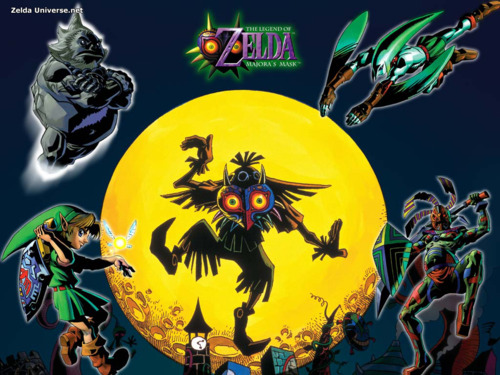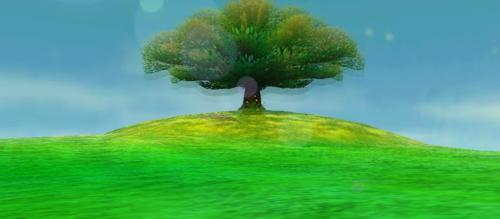According to the fans over at GameFAQs, Majora's Mask was the best game in the past decade. In one of their regular gaming tournaments decided complete by fan votes, Majora's Mask took the crown over Super Smash Bros. Brawl.
Read more here: http://www.zeldainformer.com/2010/12/majoras-mask-is-apparently-the-game-of-the-decade.html

This makes me really happy because I have been raving about this game since seemingly the dawn of time. While Ocarina of Time is clearly the 9th symphony of the Zelda series, Majora's Mask is the unsung gem, the 7th symphony haunting the senses in our peripheral, challenging the Ode to Joy in depth and scope. It is one of the most beautifully immersive and complex games I have ever played, so intricately crafted, and what I think is the major factor behind the game's power is the side quests. These side quests coupled with a Zelda game darker and deeper than its predecessors equated to a game that possessed me entirely, mind and heart.
I have always been a lover of side quests. Side quests are one of major things in a game that truly makes it expansive. Because sure, you have your main plot: bad thing happens, hero has to rectify, linear journey ensues, boss defeated, life is good. But this formula is not enough to enchant some gamers, the gamers who not only desire combat and running from point A to B, but an escape into another world where the inhabitants come alive, where the world breathes and changes with each passing second, seemingly having taken on a life of its own, disengaged and transcending beyond the coding of the developers.
Of course, the mere presence of side quests doesn't equal a great game. However, the powers that be behind Zelda have proven their wildly imaginative minds and mastery of game design time and time again since before MM. And so, when they created a game in which the side quests became a major feature, not just extra trips to boost stats or achieve a better weapon, they created a world with more personality than I have ever seen in a Zelda game. The bare bones of the game were ingenious enough as it was – the game never passed beyond 3 days (at the end of the 3 days is the apocalypse via a possessed moon), and you could travel back and forth through time, as well as slow down or speed up time. Due to this bizarre and slightly stressful layout, the side quests that followed played into the confusion of time travel.
Each side quest engaged with a side character, who suddenly, for the duration of that side quest, became the main focus of the game. These side quests were interesting to me because of their nature – they did not all consist of fantastical journeys that had no bearing on what we, as mere mortal human beings, could relate to. They dealt with human nature, they had pathos, they were real.
The one that comes to mind, and players of MM have probably predicted this, is the side quest between Anju and Kafei. This is probably one of the most intricate side quests of the game. It takes 3 days to complete this quest, and it involves a lot of strange back and forth, talking to people, delivering letters, pendants, and eventually, solving a decently challenging puzzle at the end (hey, this is a Zelda game – puzzles are mandatory). What breathes life into the challenge of completing tasks under a time constraint is the story behind it. Anju and Kafei are engaged, but Kafei is no where to be found. Anju and Kafei's mother are worried about him, especially considering the imminent destruction of Termina. The player eventually finds out why Kafei is hiding, and if everything is done right, the couple is reunited at the end. The scene is touching and bittersweet, as the couple plans to die together. They exchange their masks of the sun and the moon, creating the couples mask, which the player receives. It is for these masks that the side quests are completed due to the power that they give Link, but, and maybe it's just me, I reaped a satisfaction from helping these characters that was entirely separate from receiving the mask.
It's obvious that I am a lover of side quests, and it would take forever for me to explicate each and every side quest, each quirky character (although I must mention one of my favorites: the perfectionist mailman), each strange and different problem there is to fix. But that's not the only reason that I love this game. It's that the game, as a whole, is dark and vibrant all at once. All the characters, main or side quest, are odd, endearing, ridden with flaws and oddly compelling. The fact that you can play as a deku, goron, and zora is one of the most exciting developments of the series. The music is phenomenal, but that is no surprise, considering the Zelda series is known for its beautiful music that traverses all genres and styles. The apocalyptic conceit is a heavier storyline, a tad more of an eschatological approach, and a more chilling evil than the villain merely having control over the land. And the eponymous Majora's Mask itself… this is a mask ripe with psychological undertones. This ancient artifact is the true villain of the game, and it warps the wearer of it with great ambition, but channeled towards evil and destruction. It turns them inside out, so that the dark underbelly of their psyche is no longer hidden. The skull kid steals the mask and wears it, and it is from this point that the destiny of Clock Town, and Termina as a whole, is charted. He turns on his friends and becomes greedy and sadistic, an unwitting puppet of the malevolent mask.
I could spend all day attributing a series of adjectives to this game, like lush, rich, bizarre, deep, convoluted, magical, sad, wondrous, illusory, vibrant, etc. I know that it is criticized for its lesser number of dungeons, and even moreso, its lack of a traditional save option. It's not that you can't save – you can. But in order to do so, you must travel back to day one, retaining only the masks that you have acquired. This means the dungeons must be completed in one shot, this means quests must be completed in one shot, this means you better have done everything you wanted to do before you go back to day one, because otherwise, it's lost. It's frustrating, for sure. But I played it, many played it, and fell in love with it, and I think that's a pretty good reason to say it works. Where there is innovation, there is criticism, and that's fine. Nothing works for everyone. But considering the devoted fan base of this strange and magical game, I would say their innovative approach succeeded.
I end this with a picture of the Elysian landscape that graces the screen near the end of the game. It is a quiet like the eye of a storm, a natural ambience that is chillingly foreboding. It's the silence of a skipped heartbeat, before everything goes down. And it is only a microcosm of the game's expansive and poetic unravelings.

VentureBeat's mission is to be a digital town square for technical decision-makers to gain knowledge about transformative enterprise technology and transact. Learn More
